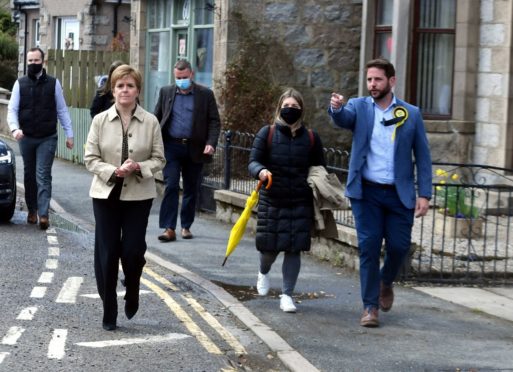The First Minister has admitted the coronavirus pandemic threatens to delay the A96 dualling between Aberdeen and Inverness.
Campaigning in the north-east, Nicola Sturgeon said she was “not going to pretend” Covid would not have an impact on major infrastructure projects.
The project, affecting 88 miles of road between the Granite City and Highland capital, was previously expected to be completed by 2030.
But speculation of delays in the upgrading project, as well as the A9 Inverness to Perth road works, has rumbled on through the pandemic.
Transport Scotland committed to delivering £6bn project
Back in February, MSPs were told by Transport Scotland director, Bill Reeve, that staff remained “absolutely committed” to delivering the £6 billion upgrades on the A96 and A9 “as soon as is practicably possible”.
Ms Sturgeon admitted the goal posts might well have to be moved, on a campaign visit to Insch.
She said: “We committed to the dualling of the A96 and we want it be completed by 2030.
“I’m not going to pretend to people that Covid has not had an impact on planning and timescales, obviously with a big infrastructure project like that you have to consult properly with local communities.
“All of that has to be factored in.
“The commitment is there, explicitly in the SNP’s plans.
“And it sits alongside, of course, our plans to try and cut car use overall as part of our net zero ambitions but we understand the importance of good quality and safe road infrastructure for the communities that depend on it.”
Transport Scotland bosses are expected to confirm later this year if the current targets of 2025 for the A9 and 2030 for the A96 are achievable.
Road branded ‘death trap’
Earlier this week, we reported that nearly 500 drivers had been caught speeding on a single stretch – from Inverurie to Huntly – of the A96 in the last three years.
Freedom of Information figures also showed four people had died and 26 were seriously after crashing on the main route between Aberdeen, Elgin and Inverness.
Scottish Conservative Alexander Burnett, defending his Aberdeenshire West seat in next week’s Holyrood election, branded it a “death trap” which was “not fit for purpose”.
While progress on the upgrades has slowed through lockdown, Nicola Sturgeon – campaigning with Mr Burnett‘s main rival in the constituency, Fergus Mutch – was keen to highlight her party’s manifesto pledge to reconnect rural communities with the railways.
Deeside and Buchan rail lines could be reinstated
The SNP has pledged to look at bringing back former rail lines, such as in Deeside and Buchan, and to explore possibilities for new ones – firstly drawing up proposals with regional transport boards.
Asked for a timeline of when would-be passengers might be able to make use of the travel links, she told us: “We want to a plan emerge for that in the early part of the parliament, obviously then implementing that plan we have to work out the detail of the funding and timing of that,” she told us.
“We have committed to dualling the A96, but we have a commitment to cut car use because that is important for our environmental targets.
“As part of that, expanding people’s accessibility to public transport is vital.
“One of our key commitments in our manifesto is bringing Scotrail into public ownership which opens up the possibility for us to be much more strategic about that.
“Communities across the north-east have a part to play in making government understand exactly what their priorities are with some of this.”
Mr Mutch added: “The £330m improvements to the Aberdeen to Inverness rail line have been a great boost with more reliable services for places like Insch, though people have not been commuting as much as they might have been to take advantage of it in the last year.
“Kintore, just down the road, has a brand new station right on their doorstep for the first time in 60 years.
“So we are reversing those historic Westminster closures of branch railway lines and if there are other options for doing that, in a way that it is viable for the region.”
